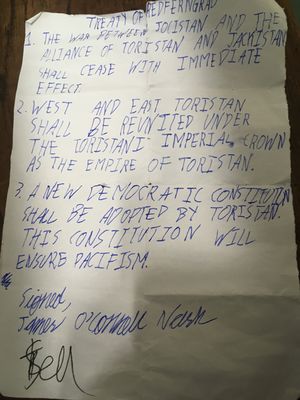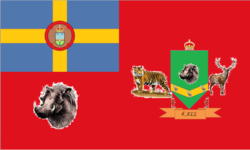Empire of Toristan
This article refers to a micronation or element of micronationalism which is defunct and no longer exists. You can help make the article reflect that or ask on the talk page for further information. |
Empire of Toristan | |
|---|---|
|
Flag | |
| File:Durham, United Kingdom | |
| Capital | Torinsburg |
| Demonym(s) | Toristani |
| Government | Monarchy, Autocracy |
• Emperor | H.R.I.M. Emperor Torin the Great |
| Establishment | Late March 2018 |
| Population | |
• Census | 3 (Approx.) |
| Currency | Pound Sterling (de facto) |
| Time zone | GMT |
The Empire of Toristan was established in late March 2018. The area claimed is a strip of garden that is estimated to be around 60 square feet. It is ruled by His Royal and Imperial Majesty Emperor Torin the Great, who rules as an absolute monarch. Toristan is partially inspired by 18th - century Japan. The Emperor also happens to be constitutional monarch of part of Great Pecuniam, a region within the British Empire.
Foreign Relations
Toristan recognises all U.N. member and observer states. It also recognises the British Empire, the Free Democratic People's Soviet Socialist Republic of Jocistan, the Autocracy of Jackistan, and the Republic of Punistan. It maintains positive diplomatic relations with those four countries.
The Monarchy
Toristan is an absolute monarchy, in which the Emperor rules by decree and is the sole lawmaking authority. The monarchy has its own coat of arms and royal standard. Theroyal coat of arms is also the de facto coat of arms of Toristan. The royal standard may only be flown over a building or ship when the Emperor is present.
History
Independence, War With Jackistan, and Post-War Diplomacy
Toristan was founded in late March 2018, having been inspired by the creation of the Free Democratic People's Soviet Socialist Republic of Jocistan, which had declared its independence earlier that month. However, the Autocracy of Jackistan soon declared war on the young nation. This conflict quickly developed into a stalemate. Jocistan, which had remained neutral due to its good relations with both belligerents, urged both sides to sign an armistice, followed by a peace treaty. After the war, relations between Toristan and Jackistan rapidly improved, culminating in today's three - way alliance between Toristan, Jackistan, and Jocistan.
On 31 March 2018, the Supreme Leader and Premier for Life of Jocistan paid a formal state visit to Toristan.

Wars With Jocistan
First War (War of the Grand Alliance/Great Patriotic War)
Outbreak of Hostilities with Toristan
On 13 September 2018, the Empire of Toristan declared war on Jocistan. The Toristani government took the decision to declare unprovoked war primarily because they were heavily indebted to the Jocistani government, and because they were confident of Jakcistani support, which they felt would make victory assured. The war was initially stalemated in battle, with most action happening in the realms of espionage. However, Jocistan gradually began to make gains.
Initial Jackistani Intervention
However, at this point, the Autocracy of Jackistan, which was allied to both Toristan and Jocistan, intervened on the Toristani side, as the Toristanis had predicted they would, declaring war on Jocistan. This led to a rapid change of strengths, with the Toristani-Jackistani side clearly winning, and began to threaten the very existence of Jocistan.
Jackistani Defection
However, the war had another twist: for seemingly inexplicable reasons, the Jackistanis switched sides, making peace with Jocistan and restoring their alliance, and declaring war on Toristan. Jackistan and Jocistan formed a "Grand Alliance", giving the war its alternative name. This once more put the Jocistani side in the ascendancy.
The Battle of Durham
The war culminated in the battle of Durham, a resounding defeat for the Toristanis. It ended with a one-man charge on the Toristani line from the Jocistani Joint Field Marshal Oscar Redfern, who single-handedly captured Emperor Torin, leading to victory for the Grand Alliance.
Treaty of Torinburg
The war was resolved with the treaty of Torinburg, which ended the war, and established a communist Jocistani client state in the eastern half of Torinburg, called East Toristan. The terms of the Treaty were these:
- Toristan must pay reparations of 1 fountain pen to Jackistan. Fountain pens are an object of great cultural significance and national pride for Jakcistanis. In Jackistani culture, surrendering a fountain pen to another for anything besides an equally good fountain pen is seen as the ultimate humiliation.
- Toristan must pay reparations of Θ5 to Jocistan.
- Toristan must recognise the total and full independence of the People's Socialist Democratic Republic of Toristan (informally known as East Toristan). Its territory is the eastern half of the capital, Torinburg.
- Toristan may not declare war on another nation (though it can still go to war if another country attacks it), and must limit the size of its military to no more than 3 people.
- East Toristan will mark 13 September as Toristan Liberation Day, and Jocistan and Jackistan will mark 13 September as Victory Day.
Reaction of Anglestonia to the Treaty of Torinburg and Ensuing Crisis
The Kingdom of Anglestonia in the British Empire, which was already in a diplomatic crisis with Jocistan (see above), responded in a somewhat reactionary manner to the peace, declaring its full support for the West Toristanis (as the remnants of the Empire were now known) and refused tor recognise East Toristan. It also offered to form an alliance with West Toristan and to support them in a war against East Toristan. This led to a worsening of the crisis, which finally ended in humiliation for the Anglestonians, when the Emperor Torin I of West Toristan officially condemned them for their stance on the conflict. In the aftermath of Emperor Torin's statement, the crisis was resolved, with Anglestonia withdrawing its various measures an the county of Jocdarshire pledging to change its name and motto (though this is yet to be done).
Second War (Second Great Patriotic War)
West Toristani Attack on East Toristan
Following the peace terms, Jocistan and Jackistan pumped colossal amounts of credit-free aid into East Toristan, hoping that its success would inspire West Toristanis to rebel against the Imperial dictatorship that the peace terms had left untouched. However, this had the opposite effect: Emperor Torin and his commanders hoped that a swift victory would deliver these resources to the West. Due to this belief, they launched a hasty and badly-planned attack, during which East Toristan remained safe while Jocistani forces dug in for a war of attrition.
Jackistani Neutrality
What was notable, however, was that Jackistan tried to stay neutral. It had tried to rebuild its alliance with Toristan after the first war, and believed that a Toristani or Jocistani victory was equally beneficial. This was exasperating for Jocistanis, while it was a major propaganda coup for Toristan, which at one point almost managed to pull off a stunning trick which, if successful, would have led to its instant victory.
The Jocistani Comrade Incident
Toristani spies successfully got out the story that Jackistan was joining the war on their side. This was reported by Jocistan's state-owned online newspaper, the Jocistani Comrade, and believed by the Jocistani military. The truth (i.e. that this was fictitious) only got out just before Jocistan was going to launch a full-scale attack on Jackistan. While this did not succeed in its main goal of bringing Jackistan into the war, it did alienate them from Jocistan and strike a blow at Jocistani morale.
Treaty of Redferngrad
It eventually became clear to both sides that if a compromise peace was not agreed, both countries would collapse.This led Jocistan's Supreme Leader and Premier for Life to draw up the Treaty of Redferngrad, which reunited Toristan, on the condition that Toristan would become pacifist and a democratic constitutional monarchy. This was agreed to by the Toristanis, and hailed by the Jocistani Comrade as "a victory for democracy".

Collapse of the Treaty of Redferngrad and Fascist Coup
However, the Treaty proved to be heavily unpopular in Toristan, leading to a succession of coups by members of the military and royal family, most notably Prince James, who tried to dissolve the territory altogether and cede its lands to the U.K. However, Emperor Torin led a successful counter-coup shortly afterwards. Though this was initially supported by Jocistan, he went on to establish a highly militaristic fascist dictatorship, renaming the country the Kingdom of Toristan and declaring war on Jocistan.
